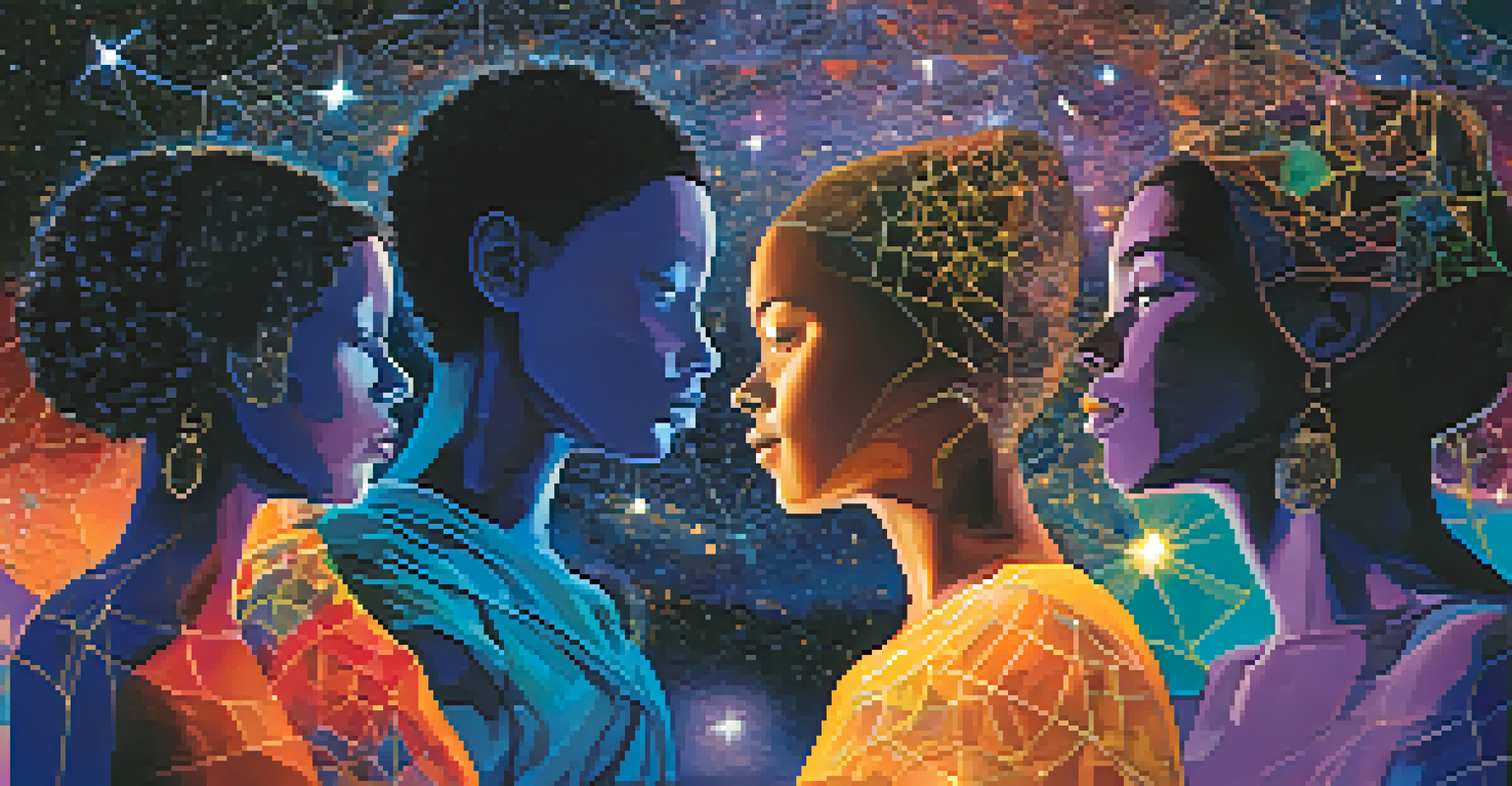Shifting Perspectives: Entheogens and Social Identity

Understanding Entheogens: A Brief Overview
Entheogens are substances that induce altered states of consciousness, often used in spiritual or religious contexts. They are typically derived from plants or fungi and have been utilized for centuries by various cultures around the world. Examples include psilocybin mushrooms, ayahuasca, and peyote, each with unique properties that can profoundly affect perception and thought.
The use of entheogens in a supportive community context can transform individual experiences into collective healing.
These substances can facilitate deep introspection, allowing individuals to explore their thoughts and feelings in new ways. By altering brain chemistry, entheogens can unlock memories and emotions that might be buried deep within our psyche. This exploration can lead to significant insights about one's identity and place in the world.
As we delve into the relationship between entheogens and social identity, it's essential to recognize the context in which these substances are used. Cultural, social, and personal factors all play a role in shaping the experiences and insights gained from entheogenic exploration.
The Connection Between Consciousness and Identity
Our identity is shaped by a myriad of factors, including culture, experiences, and personal beliefs. However, consciousness itself is a fluid concept; it can shift and change based on our environment and mental state. Entheogens have the potential to expand our consciousness, providing a fresh lens through which to view ourselves and our social identities.

When individuals consume entheogens, they often report feeling a sense of interconnectedness with others and the universe. This sense of unity can prompt a reevaluation of personal beliefs and societal norms. For instance, someone who previously identified strongly with a particular social group may begin to see the value in diverse perspectives, fostering a more inclusive identity.
Entheogens Expand Consciousness
Entheogens can alter perception and facilitate deep introspection, prompting individuals to reevaluate their identity and social connections.
Through these experiences, individuals can engage in what some call 'identity reconstruction,' allowing them to embrace aspects of themselves that they may have previously suppressed or ignored. This transformation can lead to profound changes in how one interacts with the world.
Entheogens and the Exploration of Social Norms
One of the most compelling aspects of entheogenic experiences is their ability to challenge societal norms. As users dive deep into altered states of consciousness, they often confront ingrained beliefs and assumptions about themselves and their communities. This can lead to a critical examination of social constructs like race, gender, and class.
In the depths of altered consciousness, we often find the truths that shape our identity and connect us to each other.
For example, a person might experience a sense of liberation from societal expectations while under the influence of an entheogen. This liberation can prompt discussions about identity politics and the importance of authenticity in self-expression. The insights gained from these experiences can empower individuals to advocate for social change.
Moreover, as more people share their entheogenic experiences, a cultural shift may occur, encouraging others to question societal norms and expectations. This collective exploration can lead to a more nuanced understanding of identity, fostering empathy and connection among diverse groups.
Personal Narratives: Stories of Transformation
Personal stories of transformation through entheogenic experiences are powerful testaments to their impact on identity. Many individuals share anecdotes about how these substances helped them confront deep-seated fears or traumas, leading to profound personal growth. These narratives often highlight the transformative power of vulnerability and self-discovery.
For instance, someone who struggled with anxiety might find that an entheogenic experience allows them to confront their fears head-on, leading to greater self-acceptance. This newfound perspective can reshape how they view themselves and their relationships with others, fostering a sense of belonging.
Cultural Context Matters
Understanding the cultural heritage of entheogens is essential for a meaningful experience, as it highlights their role in communal healing and self-discovery.
These personal narratives not only inspire others to explore their identities but also emphasize the importance of community support in the journey of self-discovery. By sharing their stories, individuals can create spaces for open dialogue and connection, reinforcing the idea that we are all on our unique paths of exploration.
Cultural Context: Indigenous Practices and Modern Use
Throughout history, many indigenous cultures have incorporated entheogens into their spiritual practices, viewing them as sacred tools for healing and self-discovery. These traditional practices often emphasize the importance of community and shared experience, which can significantly influence the way individuals perceive their identities within a cultural framework.
In contrast, modern usage of entheogens, particularly in Western contexts, can sometimes lack this communal aspect. When individuals use these substances in isolation, they may miss out on the rich cultural narratives that accompany their use. Understanding these cultural contexts can deepen the experience and provide valuable insights into one's identity.
As the conversation surrounding entheogens grows in contemporary society, it becomes increasingly important to honor and respect the traditions from which they originate. By bridging the gap between indigenous practices and modern applications, we can foster a more holistic understanding of the role entheogens play in shaping identity.
The Risks and Ethical Considerations of Entheogenic Use
While entheogens can offer profound insights and transformative experiences, they also come with risks. Not everyone is prepared for the intensity of these experiences, and for some, they may exacerbate underlying mental health issues. It's crucial to approach entheogenic use with caution and awareness of one's mental and emotional state.
Ethical considerations also come into play, particularly regarding cultural appropriation and the commodification of sacred practices. As entheogens gain popularity, it's important to engage with these substances responsibly and respectfully, acknowledging their roots in indigenous traditions. This means prioritizing education and understanding over mere recreational use.
Risks and Ethics of Use
While entheogens offer transformative potential, they also present risks and ethical considerations that necessitate responsible engagement and respect for indigenous traditions.
By fostering a responsible approach to entheogenic exploration, individuals can maximize the benefits while minimizing potential harm. This balanced perspective can lead to more meaningful experiences and a deeper understanding of how these substances can shape identity.
Future Implications: Entheogens and Social Identity
The future of entheogenic exploration promises exciting possibilities for personal and social identity. As research continues to shed light on the therapeutic potential of these substances, we may see a shift in societal attitudes toward their use. This could pave the way for more open discussions about mental health, spirituality, and the complexities of identity.
Furthermore, as more people share their experiences and insights, we can expect a growing movement toward inclusivity and understanding within communities. Entheogens may serve as catalysts for change, encouraging individuals to engage in conversations that challenge existing social norms and promote empathy.

Ultimately, the journey of exploring entheogens and their impact on identity is just beginning. By embracing these experiences with curiosity and respect, we can foster a deeper connection to ourselves and one another, shaping a more compassionate society.